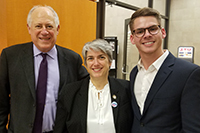
Students in a John Marshall Law School legislative drafting class were treated to an expert lecture on directing democracy and zealous advocacy when former Illinois Governor Pat Quinn dropped by to offer a few tips.
Quinn, who served as governor of Illinois from 2009 to 2015, reminded students that as lawyers their duty is to do justice and be zealous advocates for their clients. Quinn used his career as a lawyer, politician and grassroots organizer as an example of how zealous advocacy can be used as a strategy to advance causes.
Quinn highlighted many of the causes that catapulted him into the spotlight in Illinois politics, most of which were based on his preferred method of “petition passing and referenda.” He noted that he first landed in the political spotlight in the 1970s when he spearheaded three state constitutional amendments on legislative ethics. In 1980 he led a successful petition and referendum effort to reduce the size of the Illinois House of Representatives, and in 1982 to form the watchdog Citizen’s Utility Board. As governor he used his position to advocate against the death penalty and for same-sex marriage. Even now he continues to advocate for causes through several legislative initiatives, including one that would impose term limits on the Chicago mayor and another advocating an elected statewide consumer advocate.
Quinn told the class that he has learned important lessons from all of his elected offices and still strongly believes in the petition passing and referendum process. He also served as Illinois’ Lieutenant Governor from 2003 to 2009 and as the Illinois Treasurer from 1991- 1995.
“We were honored to have Governor Quinn interact with our students and to share his insights on ways they can use advocacy to positively impact the public good,” said Dean Darby Dickerson. “He was very generous with his time, and the students were eager to learn from him.”
Quinn spoke to students in an advanced Lawyering Skills course on legislation and the legislative process in Illinois. John Marshall students must take four semesters of legal writing programs. The upper-level courses include specialized drafting courses such as Spanish for Lawyers, Representing the Technology Client, and Drafting Legislation. John Marshall’s Lawyering Skills program is ranked among the top five programs in the nation by U.S. News & World Report.

